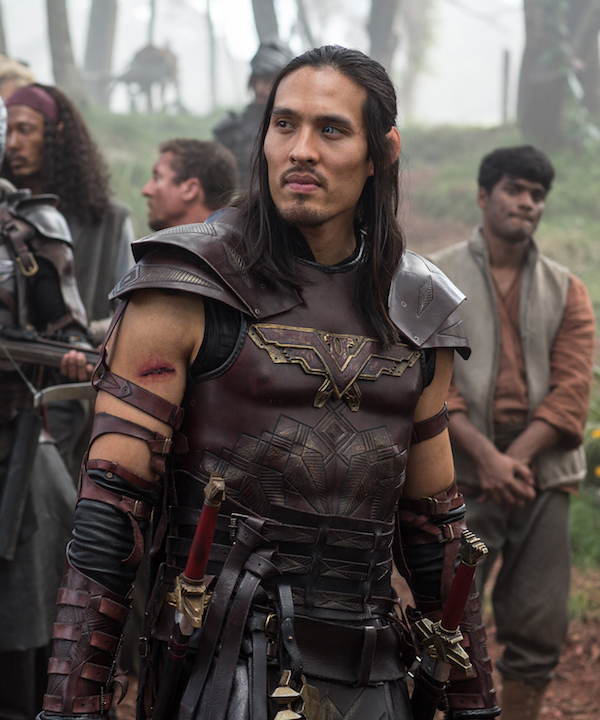Desmond Chiam can be seen leading a murderous army across the Four Lands every Wednesday night on “The Shannara Chronicles,” but before he nabbed the role of General Riga on SpikeTV’s fantasy series, Chiam had to navigate Australia’s tricky film and television industry, where roles for Asian actors were few and far between.
Here’s what the Chinese Singaporean actor had to say about ditching his law degree for the screen, interacting with “Shannara” fans on Twitter and why he’d choose Singapore over Melbourne and Los Angeles:
How did you get into acting, and how did you come to join “The Shannara Chronicles”?
I got into acting very circuitously. As has been frequently said to me by my parents, I was meant to be a lawyer. I went to law school, and I worked as a lawyer for a few months. Then, I decided that it was not meant to be. I was miserable. I quit, and I was directionless for a little bit. I had done a play when I was in college, and I was in a couple of ads to help pay off the debt of law school. So I thought, “I could maybe do that. I could try it out.” I ended up searching for an agency in Australia, and I found one that handles Asian talent. Mind you, there weren’t many of us in Australia at that time. From there, the rest is history.
As far as “Shannara” goes, getting that seemed sort of serendipitous. I was a fan of the books growing up. I was working on another project at the time, and “The Shannara Chronicles” came through. I shot a self-tape and sent it over, and a few days later, they were like, “Cool! You got it!” It felt very, very unreal. I was convinced it was a prank all the way up until I got onto the plane to New Zealand, then it started to feel too real. I was going to be a part of this crazy fantasy series that I’ve loved since I was a boy.
How are you similar to or different from your character, General Riga, on “The Shannara Chronicles”?
I don’t murder as many people. (laughs) I guess [Riga] has a thing with fixation. He really fixates on one specific thing, one specific goal, and it blinds him. I get very deeply obsessed with any particular task that is in front of me at any given moment. Which is why I think acting has worked out so well for me, because it is something that you do have to fixate on, otherwise it makes you very, very sad.
Have you had much interaction with the “Shannara Chronicles” fandom?
Yeah, we do live tweets every time a new episode comes out. It’s fun to do, and the fan reaction has been pretty good. There’s been good reception, specifically for the casting that has happened this season. Every single person who was added [to the cast] was a person of color, and that alone has drawn a lot of opportunity to this show. I met a lot of fans [of color] who had that problem with the first season, fans who thought it would be nice to see some faces like theirs.
It’s cool to see people freaking out in the moments that we hoped they would freak out. It’s cool that they’ve gotten really invested in certain relationships. It’s cool to even see them hate my character! Which is a really, really unique experience. There have been tweets that pop up like “Oh my god, General Riga, I hate this guy!” and then I’ll tweet them back and say, “I have a point, though!” and sometimes they’ll reply, “Oh my God, yes, I like you!” It’s really funny.
Are you keeping up with any other television shows this season apart from “The Shannara Chronicles”?
Yeah, “Stranger Things.” It’s so good. “Brooklyn Nine-Nine.” I love comedies. My guilty pleasure: I’ve been watching a lot of HGTV recently.
Is there an HGTV show you like to watch?
What the one with Chip and Joanna Gaines, the most wholesome family in America? (Editor’s note: It’s “Fixer Upper.”) Is it called “Flip or Flop?” No, that’s a different one. There’s “Property Brothers” as well.
You are also a writer.
Screenwriting came around to me after I got into acting, as part of the fact that there weren’t any roles in Australia for Asians at the time. When I was coming up [as an actor], there wasn’t space for more than maybe one or two Asian actors on screen at any given point. So a lot of us actually took up screenwriting. I ended up going to USC for screenwriting. I was in their master’s program for a couple of years.
You’ve spent a lot of time between L.A., Singapore and Melbourne. If you could choose just one of those places to live, which would it be?
Singapore feels like home. My dad worked in Singapore, but we actually lived in Melbourne, and we would fly back and forth. When I was younger, we would spend maybe four months out of the year in Singapore. When you’re an Asian kid growing up in Melbourne and you’re one of three Asian people at an Anglican boys’ school, there’s certain things that happen, and being in Singapore meant that I didn’t have to deal with that. In Singapore, it was family and cousins and I could just be me without having to explain things. Singapore has that confluence of Eastern and Western cultures, and it’s one of the most welcoming places for that kind of heritage, I think.









